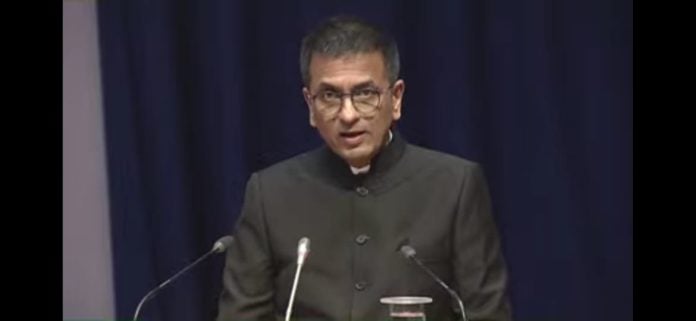Chief Justice of India D.Y. Chandrachud on Saturday said that he has never faced any kind of pressure from the executive, however, there was a constant battling going on between his conscience, mind and intellect regarding cases that came up before him.
Speaking during the India Today Conclave on ‘Justice in the Balance: My idea of India and the importance of separation of powers in a democracy,’ the CJI said it became especially true when deciding cases having wider ramifications for the society.
He said the judges did a lot of hard work and based their verdicts envisioning the future. They had to introspect and reflect. There was no pressure, but an attempt to search for the truth and correct solution.
The CJI said that if there was any pressure from the executive, the Supreme Court could not have given the verdict related to the appointment of Election Commissioners.
The March 2 verdict on EC was just one judgment, there were many which did not make headlines. The largest litigant in India currently was the State. Most of the judgments involved the State & its instrumentalities, he added.
As per the CJI, there was absolutely no issue, since the courts were constantly holding the government accountable. The courts were speaking truth to the people in power, even the governments were fine with it as long as they knew their field of demarcation and the judges knew theirs.
He said the Indian democracy was robust and all citizens had full faith in it. Over the past 70 years, democracy had developed in leaps and bounds.
On separation of powers, he said the judiciary was well aware of the thin line that separated policy and politics from law. In some cases, the line was not as easily defined, but the judges have to do that exercise regardless of difficulty.
He said people had grown increasingly distrustful of public institutions due to social media. He said he did not follow Twitter for the reason that it was important to not be affected by the cacophony of extreme views which were there sometimes.
As per the CJI, a couple of decades ago, only a handful of cases would be reported. Social media has changed that. There’s live-tweeting of every word said in court. This has put an enormous burden on the judges.
Regarding the transparency of Collegium System, the CJI said transparency has two facets – the process of appointment and choices made during the appointment. Process has to be completely transparent. This is the reason why the Apex Court had been putting out resolutions on the internet, he added.
Stating that no system was perfect, the CJI said Collegium was the best system that the Supreme Court could develop. The object was to protect the independence of judiciary, which was a cardinal value. It was important to insulate the judiciary from outside influences if the judiciary has to be independent, he noted.
Regarding Law Minister Kiren Rijiju objecting to the SC Collegium revealing government’s reasons for not appointing judges, the CJI said he did not see anything wrong in having difference in perception. However, this needed to be dealt with such differences with a sense of robust constitutional statesmanship
He said he respected the Law Minister’s perception. However, the reason behind putting the government’s reason on the website was to meet criticism that the Apex Court lacked transparency and genuine belief that opening up the processes would foster greater confidence in their work.
Speaking about the candidature of Advocate Saurabh Kirpal for appointment as judge at the Delhi High Court, the CJI said that every aspect of the IB reports was in public domain. The candidate was open about his sexual orientation.
He further said that people might say that revealing IB reports publicly might compromise sources of information and put lives in danger. However, this case did not fall under that category. The report dwelt on the sexual orientation of an openly gay candidate for prospective judgeship.
It was already known and reported about. The sexual orientation of a candidate had nothing to do with his ability or constitutional entitlement to assume a high constitutional office of HC judge, he added.


